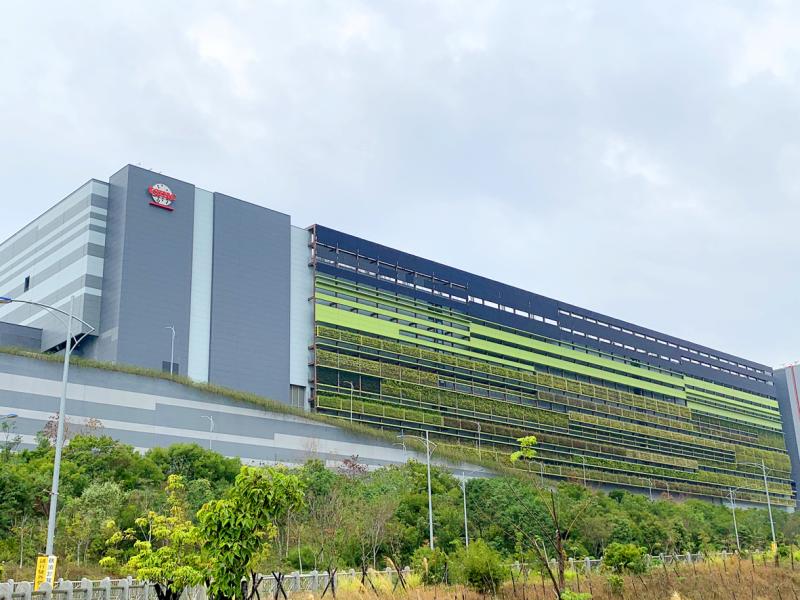The nation’s green bond issuance is expected to set a record of NT$56.6 billion (US$1.97 billion) this year, up 12 percent from NT$50.2 billion last year, as companies took advantage of lower interest rates to raise funds, Taipei Exchange (TPEX) data showed.
Taiwan Semiconductor Manufacturing Co (TSMC, 台積電) yesterday issued NT$12 billion of green bonds in three tranches, the first for the world’s largest contract chipmaker, boosting the nation’s cumulative green bond issuance to NT$53.6 billion this year to date, the data showed.
TSMC has said it would use the proceeds to cover its capital expenditure for green buildings and other projects aimed at environmental improvement.

Photo: Hung Yu-fang, Taipei Times
The coupon rates of TSMC’s green bonds hover between 0.4 and 0.48 percent, lower than the rates of 0.5 to 0.67 percent for the corporate bonds it issued earlier this year, TPEX data showed.
TSMC’s green bonds were the third-largest issuance so far this year, following Orsted Wind Power TW Holding A/S’ green bonds valued at NT$15 billion and Taiwan Power Corp’s (Taipower, 台電) green bonds valued at NT$12.8 billion, the data showed.
HSBC Bank Taiwan Ltd (匯豐台灣商銀) yesterday said it would issue NT$3 billion of five-year green bonds with a coupon rate of 0.4 percent on the TPEX on Dec. 25, adding that the bonds would rank first in terms of size among all green bonds issued by financial firms.
The bank’s issuance would raise the nation’s cumulative green bond issuance to NT$56.6 billion, which would be a new record for a single year, the data showed.
HSBC Taiwan, which has been focusing on financing offshore wind projects, would use the proceeds to finance the projects and other green loans, the bank’s head of global markets Ruby Ho (何汝平) told the Taipei Times by telephone yesterday.
Although the bank could also use deposits as financial resources, issuing long-term bonds with fixed rates could help keep the bank’s capital ratio and liquidity ratio at better levels, Ho said.
“Green bond issuance has been hot this year, non only in Taiwan, and the primary reason is lower interest rates,” Ho said, adding that the financial instrument is expected to remain popular next year, as the local regulator has been promoting green financing.
Asked if she expects small and medium-sized enterprises (SMEs) to increasingly issue green bonds, Ho said it would depend whether they have specific green projects, as the proceeds from green bonds can only be spent on eligible projects.
Furthermore, as companies need to have a third-party organization check their green projects, which would be a costly process, SMEs might consider issuing green bonds instead of regular corporate bonds when their demand for funds are high enough, Ho said.

SEMICONDUCTORS: The German laser and plasma generator company will expand its local services as its specialized offerings support Taiwan’s semiconductor industries Trumpf SE + Co KG, a global leader in supplying laser technology and plasma generators used in chip production, is expanding its investments in Taiwan in an effort to deeply integrate into the global semiconductor supply chain in the pursuit of growth. The company, headquartered in Ditzingen, Germany, has invested significantly in a newly inaugurated regional technical center for plasma generators in Taoyuan, its latest expansion in Taiwan after being engaged in various industries for more than 25 years. The center, the first of its kind Trumpf built outside Germany, aims to serve customers from Taiwan, Japan, Southeast Asia and South Korea,

Gasoline and diesel prices at domestic fuel stations are to fall NT$0.2 per liter this week, down for a second consecutive week, CPC Corp, Taiwan (台灣中油) and Formosa Petrochemical Corp (台塑石化) announced yesterday. Effective today, gasoline prices at CPC and Formosa stations are to drop to NT$26.4, NT$27.9 and NT$29.9 per liter for 92, 95 and 98-octane unleaded gasoline respectively, the companies said in separate statements. The price of premium diesel is to fall to NT$24.8 per liter at CPC stations and NT$24.6 at Formosa pumps, they said. The price adjustments came even as international crude oil prices rose last week, as traders

Taiwan Semiconductor Manufacturing Co (TSMC, 台積電), which supplies advanced chips to Nvidia Corp and Apple Inc, yesterday reported NT$1.046 trillion (US$33.1 billion) in revenue for last quarter, driven by constantly strong demand for artificial intelligence (AI) chips, falling in the upper end of its forecast. Based on TSMC’s financial guidance, revenue would expand about 22 percent sequentially to the range from US$32.2 billion to US$33.4 billion during the final quarter of 2024, it told investors in October last year. Last year in total, revenue jumped 31.61 percent to NT$3.81 trillion, compared with NT$2.89 trillion generated in the year before, according to

PRECEDENTED TIMES: In news that surely does not shock, AI and tech exports drove a banner for exports last year as Taiwan’s economic growth experienced a flood tide Taiwan’s exports delivered a blockbuster finish to last year with last month’s shipments rising at the second-highest pace on record as demand for artificial intelligence (AI) hardware and advanced computing remained strong, the Ministry of Finance said yesterday. Exports surged 43.4 percent from a year earlier to US$62.48 billion last month, extending growth to 26 consecutive months. Imports climbed 14.9 percent to US$43.04 billion, the second-highest monthly level historically, resulting in a trade surplus of US$19.43 billion — more than double that of the year before. Department of Statistics Director-General Beatrice Tsai (蔡美娜) described the performance as “surprisingly outstanding,” forecasting export growth